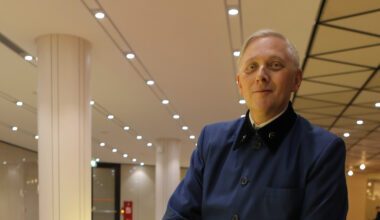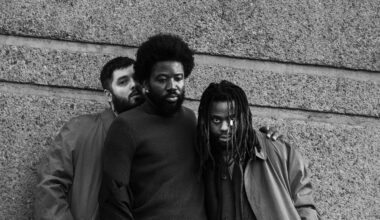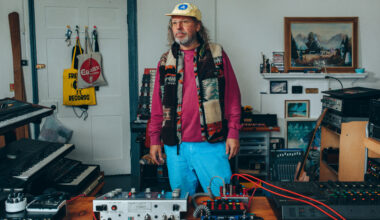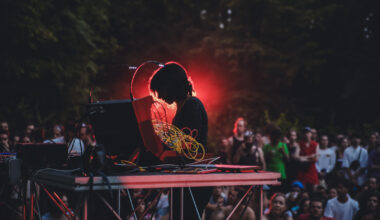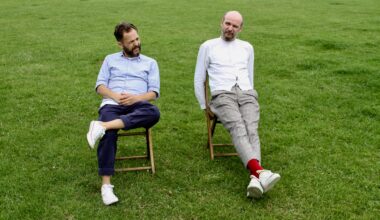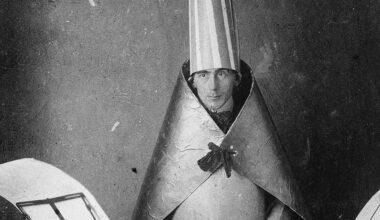Not content on resting on her classically-trained laurels, Poppy Ackroyd takes inspiration from nature and revels in an unconventional approach to tickling the ivories
There is an argument to be had that the burgeoning genre of neo-classical music is a series of modern pastoral orchestrations. Many of these works conjure landscape, geographies, psychogeographies and topographies with profound sentience. Think of Hauschka’s ‘Abandoned City’ with its poetic vistas of entropy. Or Ólafur Arnalds’ ‘Island Songs’, recorded in, and evoking, lost and desolate parts of his Icelandic homeland. Or Max Richter’s portentous and swelling soundtrack work on ‘The Haunted Ocean’ from ‘Waltz With Bahir’, not to mention ‘The Rising Of The Sun’ from ‘Testament Of Youth’.
Exhibit four could well be the work of Poppy Ackroyd, a virtuoso neo-classical musician, composer and producer recently signed to One Little Indian. It’s a label whose work, like that of their figurehead Björk, has often been inspired by and touched upon the realm of nature. The titles alone of some of her tracks, ‘Glass Sea’, ‘Feathers’ and ‘Birdwoman’ should tell you this. Take ‘Rain’, for example, beginning with a gentle field recording that merges into droplets of piano that ebb and flow like sprinklings of water from the sky.
It seems that this love of nature began young for Poppy. Each year, her father (the renowned landscape artist and Royal Academician Norman Ackroyd) would take the family to bucolic beauty spots around the UK for walking holidays. If you look at his watercolours you can see the sort of locations he was attracted to; places such as Cartmel and Coniston in the Lake District, Blakeney in Norfolk and Ludlow in Shropshire.
“I grew up going on holidays all over the UK,” she explains, with more than a hint of nostalgia. “Beautiful locations, mountains, lakes; I spent all of my childhood wandering around the British Isles. Maybe that’s had a big influence.”
Clearly it has, as the influence of landscape and place, wildlife and environment continues well into adulthood. Although Brighton-based these days, she lived in Edinburgh during the making of her first album, 2012’s, ‘Escapement’. She would work on the album all morning then climb Calton Hill or Arthur’s Seat in the afternoon, while listening to what she had just recorded. When she moved to the south coast three years ago, she initially found herself living near the seafront, where she would also go for long walks.
Every summer for the past seven years, her father has chartered a boat to visit islands such as St Kilda, North Rona and the Outer Hebrides. Poppy and her boyfriend, Joe Acheson (whose work as Hidden Orchestra we can thoroughly recommend) have travelled alongside him with an interesting group of friends, among them artists and architects, which all sounds a little bit like Virginia Woolf’s ‘To The Lighthouse’. Norman Ackroyd uses the journey as the basis for an annual series of prints that he makes, but it has also provided inspiration for Poppy’s instrumentals too.
“I got the idea for ‘Glass Sea’ from my first album when we were on the boat,” she says. “The sea was like a mirror and the boatman said, ‘Oh, we’ve got a glass sea’ and there was the track.
The whole track is meant to feel like the constant change of the sea and the unease you feel when you approach the island and the water gets more choppy.”
You can hear both the mirror-smooth surface of the water and the gentle listing of the boat in the undulating waves of piano melody on this track, a serene meditation on the sea’s shape-shifting forms.
As you can imagine, Poppy Ackroyd had a pretty interesting childhood with an artist dad and art gallery-running mum.
“I grew up surrounded by lots of arty people,” she recalls, telling me they lived by the Thames in London between London Bridge and Tower Bridge. “I thought being in a creative environment, going to exhibitions and being surrounded by designers and artists of different types was a normal thing to do.”

Music was very important in the Ackroyd household with her dad having the radio on all day as a soundtrack to paint to.
“He’d always have the radio on, it was either Radio 4 or something classical, so I grew up listening to a lot of Schubert and Beethoven and lots of Mozart.”
Her dad’s heyday was the 1960s and she tells me he’d also listen to records, the likes of Bob Dylan, Rolling Stones and Paul Simon.
“He taught me not to stick to just one specific genre; he said that I should search out things that are good,” she says. “Even if it was really raw, as long as it had a genuine authentic message behind it.”
She began playing violin aged six and took up the piano when she was eight. It was fairly obvious from early on that she had a talent, so she auditioned for the Guildhall School Of Music & Drama, where she studied for the last few years of primary school. She then landed a scholarship to a London secondary school, which had an excellent music department.
“I started going out to clubs and gigs pretty young, aged about 13, and basically just spent every weekend going to see bands while I was in London,” she offers. Her tastes in music were, and still are, catholic to say the least. While her training was classical, she liked “punk stuff and rock stuff and indie stuff and more dancey stuff and hip hop stuff – a whole mix”. She says two of her favourite acts growing up were Radiohead and Aphex Twin.
After realising the piano was what she wanted to focus on, she stopped learning violin at 16 to concentrate on the ivories. Following her A-levels, she secured a place studying a four-year bachelor’s degree in Music at Edinburgh University, which she followed with a master’s in Piano Performance at the same institution.
I’m interested to know where she feels she fits in to the neo-classical world. I tell her that it appears, to me, to be very male-dominated; all the well-known producers and musicians that spring to my mind – Jóhann Jóhannson, Max Richter, Hauschka and Nils Frahm – are men.
“There are women involved in the scene,” she counters, naming cellists Zoe Keating and Julia Kent who make minimalist music with a loop pedal. “There are a lot of people experimenting, but I think it’s just being lucky enough to get some exposure. It’s a question I don’t know the answer to.”
She muses that for her, a virtuoso pianist and violinist, the issue was not musical, as she’d had a very thorough classical training. The obstacles were to do with her actually getting into a studio and learning about production.
“I couldn’t even use a computer when I started out,” she admits, telling me that Nils Frahm did the final mixes on her first album and that even now, boyfriend Joe will help out with the production side as he is a lot more experienced. “Gradually, in time, I got my head around it, but there was a lot of brain ache. I’d like to say there isn’t a lot of difference between the sexes, but I think guys find it easier to sit for long hours in a room with a computer!”
What she may lack in technological nous she more than makes up for in musical innovation. For previous recordings she had exclusive access to record in a keyboard museum in Edinburgh, reviving historical instruments such as the spinet, clavichord and harpsichord.
Her new album, ‘Resolve’, features all kind of weird and wonderful instrumentation, making her something like the Matthew Herbert of the neo-classical scene. The track ‘Paper’, for example, features experimental beats created by using paper over piano strings.
‘Stems’, by contrast, was borne from the sounds of some unexpected instruments.
“It’s the music for the soundtrack of a short animation,” she reveals. “I wanted to create the sound of children playing piano so some of it is wine glasses and some of it is the sound of an old pianino, but it was all quite out of tune, so you get this really wonky sound.”
Poppy admits ‘Resolve’, although not always overtly melancholy, was the product of a difficult few years where she experienced loss, grief and stumbling blocks in her life. She won’t elucidate what these were exactly, just that it wasn’t the easiest of times for her. Having come out of university and released two acclaimed albums, life showed her challenges she hadn’t expected.
“The album is about experiencing sadness and pain and problems,” she concedes. “I kind of want to keep it abstract. I’ve had an intense year. I’ve found that sometimes you can have a lot of obstacles that might take over, but in this case I could deal with them all. As you get older and more things happen to you, the stronger you become. I found a strength that I hadn’t had before.”
‘Resolve’, therefore, has a dual meaning.
“You can resolve something in music so that it has a happy ending, but it’s also about strength,” she explains.
And while this music is more contemplative and meditative than traditionally muscular, bold or bombastic, there is a definite fortitude to Poppy’s modulations. The emotional tenor may be subtle, but it is stealthily powerful.
‘Resolve’ is out on One Little Indian

